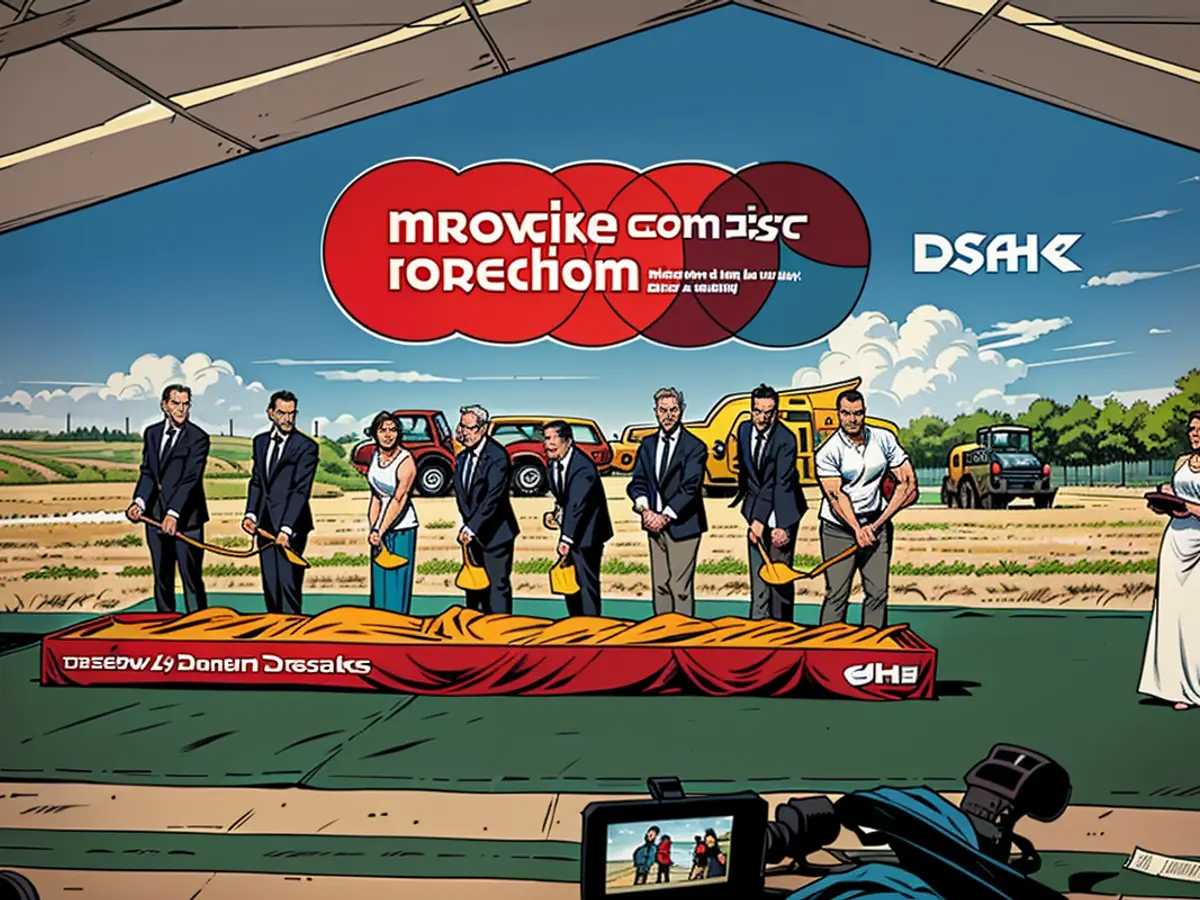- The construction of the chip factory in Dresden is underway - "We're extraordinarily excited"
Symbolic Commencement of TSMC's First European Chip Factory in Dresden
The grand commencement of TSMC, the Taiwanese semiconductor colossus, constructing its first European factory, was symbolically marked. "The largest microchip manufacturer globally is setting foot on our continent, aligning with three European champions," stated European Commission President Ursula von der Leyen at the Dresden ceremony.
An investment of approximately ten billion euros is a joint venture between Taiwanese industrial powerhouse TSMC and established European entities, Bosch, Infineon, and NXP Semiconductor. TSMC will hold a 70% stake, with the remaining partners holding a ten-percent share each. The facility will be christened European Semiconductor Manufacturing Company (ESMC) and is a central project under the European Chips Act, aiming to foster advanced and eco-friendly semiconductor manufacturing in Europe.
Government Provides Billion-Euro Subsidy
The German Federal Ministry of Economics intends to support this project by contributing five billion euros. On Tuesday, Brussels issued the green light following regulation examination. As the first factory built in Europe under the Chips Act, this satisfies the prerequisites for state aid, according to von der Leyen, who subsequently approved it in the morning.
"By supporting the semiconductor industry, we're not merely supporting the industry itself," highlighted Federal Chancellor Olaf Scholz (SPD). Shadowing the forthcoming production sites, extensive networks of research, development, start-ups, and suppliers will emerge.
"The Dresden plant will help address the burgeoning semi-conductor demand in Europe's rapidly expanding automotive and industrial sectors," mentioned TSMC CEO C. C. Wei. "With this state-of-the-art facility, we'll bring TSMC's cutting-edge manufacturing strategies closer to our European clientele and partners."
The advantages extend beyond Dresden and Saxony, according to von der Leyen. Enhanced supply chains, tailored European market-oriented products, and geopolitical tensions' mitigation will benefit the European industry.
Scholz Expresses Delight
"We rejoice that a significant global semiconductor player is now setting up shop here," expressed Federal Chancellor Olaf Scholz (SPD) during the event. He also underscored the relevance of semiconductors in achieving climate neutrality, noting that this can only be accomplished through wind power, photovoltaics, and climate-neutral mobility. "However, they all share one commonality: they necessitate semiconductors, a substantial number of semiconductors," he added, mentioning that today, an electric vehicle contains two times as many chips as a vehicle with an internal combustion engine.
Saxony's Minister President, Michael Kretschmer (CDU), praised it as a momentous event. "Dresden is the best location for microelectronics in Europe," he proclaimed. "Silicon Saxony symbolizes future technology, economic policy, and scientific policy that has consistently endeavored toward a common goal, in collaboration with numerous partners, for many years and decades — including Bosch, Globalfoundries, and Infineon." Kretschmer acknowledged Scholz's personal involvement in the TSMC settlement.
Trade Union Demands Collective Agreement for Workers
IG Metall Chair Christiane Benner hailed the investment. With TSMC and the joint project, ESMC, a substantial chunk of Germany's industrial future and self-reliance is arriving. "It's right that public funds are invested in future development. But it should be remembered that not only the company's ideal conditions, but also those of the employees, should be met, and that implies: collective bargaining agreements and secured, well-compensated jobs."
According to Bitkom CEO Bernhard Rohleder, Dresden's groundbreaking ceremony is "a turning point for Germany's technology hub." "The state aid is well-invested and ensures a level playing field in competition with leading chip locations, such as Asia or the USA," he stated, emphasizing the necessity to focus on other semiconductor and application sectors and attracting specialists to Germany.
Construction is slated to commence in 2027. The manufacturing focus will be on chips for the automotive industry, with the first TSMC European factory projected to generate 2,000 jobs.
- The EU has shown its support for this venture, with European Commission President Ursula von der Leyen stating that TSMC's factory aligns with three European champions.
- The EU Chips Act, a central project aimed at fostering advanced semiconductor manufacturing in Europe, will be significantly bolstered by the construction of TSMC's factory, which is a key component of the act.







